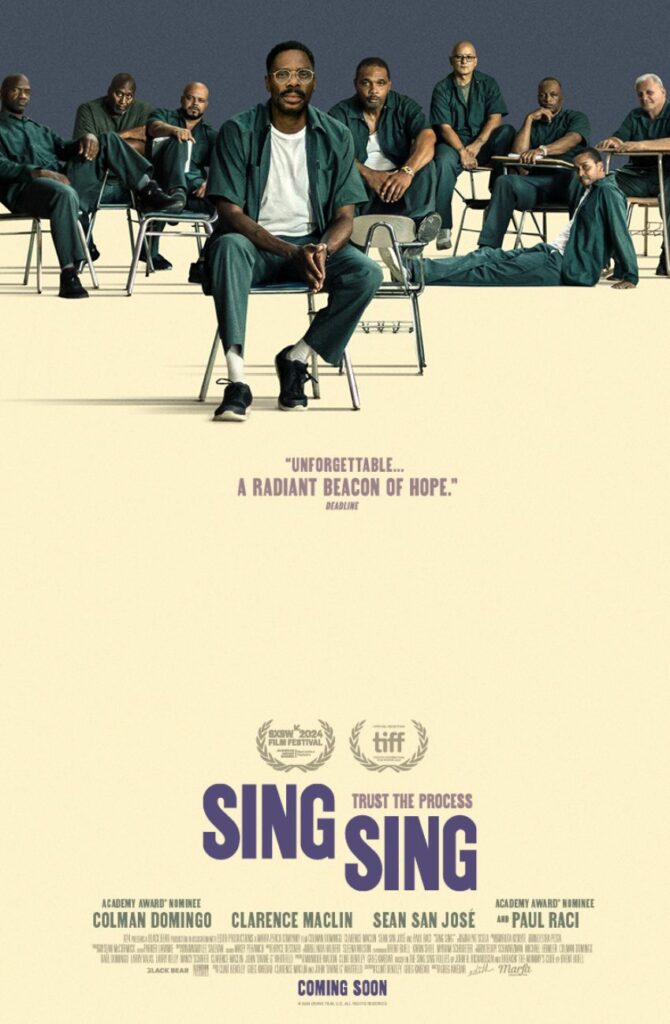
Sing Sing illuminates The Healing Power of Performance
As powerful a treatise on the correctional system as it is on the nature of performance.
Directed by Greg Kwedar
by Prabhjot Bains
- Published on
In the wake of dividing his kingdom between his selfish daughters, King Lear laments: “When we are born, we cry that we are come to this great stage of fools.” It’s a cynical description of man’s flawed and destructive nature but it’s one that takes on a life of its own when recited in director Greg Kwedar’s Sing Sing.
Shakespeare’s proverbial stage becomes a prison and the fools its inhabitants, who continue to assume the roles their institutions force upon them. Kwedar’s tender ode to a prison theatre program illuminates how inmates are often actors without knowing it, embodying a system’s idea of who they ultimately are. Only through assuming different, fictional characters do they tap into their true selves and break free of labels that loom over them their entire lives. In exploring such realities with rare grace and vulnerability, Sing Sing is as powerful a treatise on the correctional system as it is on the nature of performance.
Kwedar’s prison drama doesn’t revolve around a convoluted escape plan or a deadly riot but the freedom of a shabby stage. Sing Sing centres on John “Divine G” Whitfield (Coleman Domingo), an inmate and kickstarter of the Rehabilitation Through the Arts (RTA) program at New York’s maximum-security Sing Sing Correctional Facility. He and a small group of prisoners work to stage their next production, which veers from drama and Shakespeare to a time-traveling comedy upon the suggestion of their newest member, The hotheaded Clarence “Divine Eye” Maclin (who plays himself). At the same time, Divine G builds a case to prove his innocence at his latest parole hearing.
Sing Sing quickly takes on a meditative presence when it immerses us in the troupe’s creative process. As each inmate labours to find their voice, to define their character’s headspace, the film manifests as a kind of soothing therapy session for audiences, prompting a look inward at the manufactured roles we too play on a daily basis. When coaching Divine Eye’s take on Hamlet, Divine G notes anger is simple but “playing hurt is difficult.” It’s a statement that especially reverberates in an environment where many are easily reduced to the character of an angry drug dealer or gang banger, where a sea of constant disapproval and doubt makes playing yourself the hardest role. Sing Sing is rife with such bracing, contemplative moments, succeeding as both a piece of activism and an engrossing narrative.
Much of Sing Sing’s success as a progressive slice of docudrama is due to its commitment to unadorned authenticity. Each of the film’s engrossing confessionals and anecdotes leave us just as vulnerable as its characters—many of whom are played by real-life inmates who are alumni of the RTA program. We’re often left wondering whether what we’ve heard is real or just a product of Kweder and Clint Bentley’s improvisational screenplay. It’s an effect that underpins the film’s examination of performance, where truth and one’s sense of self are ironically found through acting as someone else. It’s only through understanding others (even if they’re fictional), do we begin to understand and truely embody ourselves.
Pat Scola’s warm, textural cinematography slowly cascades through each cell, rehearsal, and conversation, rendering us silent participants in each of the troupe’s meetings. His lens captures a solemn beauty, both within the echoing halls of prison theatre and whistling greenery outside its barbed fences. There’s a painterly quality to Sing Sing that’s hard to shake, inviting us to come closer to its characters with each grainy frame.
Domingo’s subtle, stirring turn revels in complete vulnerability. He doubles as an open book, breaking through walls both physical and allegorical, imposed and self-imposed. In an ensemble full of real-life inmates, Domingo appears just as genuine in a performance primed for Oscar glory. Newcomer Maclin, also an alum of the RTA program, embodies everything a star-making performance should be: earnest, enthralling, and difficult to categorize. He reaches for explosive emotions with the softest of touches.
While Sing Sing can be a little too overt with its messaging, sometimes feeling like a glorified ad campaign for the RTA program, it’s crafted with great sincerity and humility. Kwedar and Bentley deliver a different kind of prison drama, one that finds freedom by digging inward.
Sing Sing releases in theatres nationwide on August 16.

